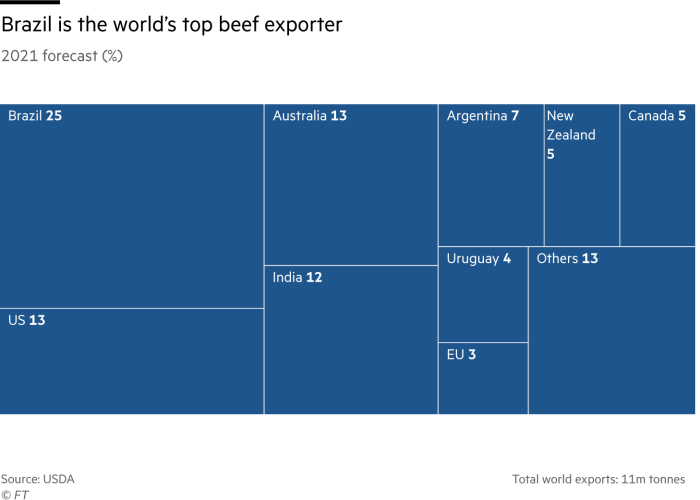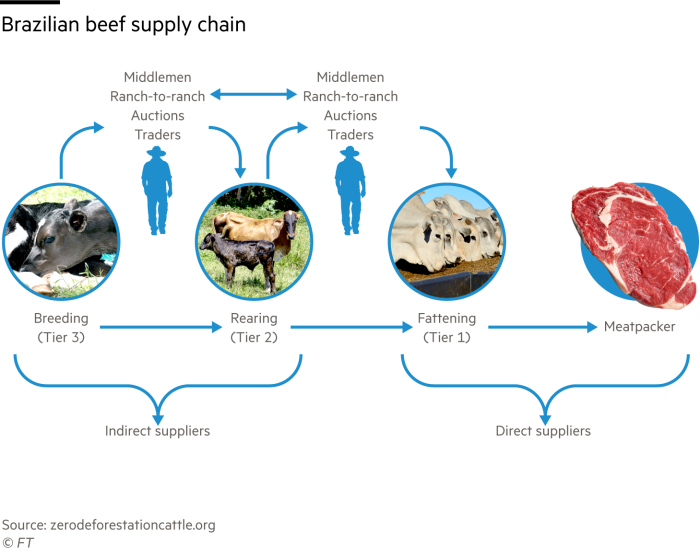European supermarket chains J Sainsbury, Carrefour and Ahold Delhaize will stop selling several Brazilian meat products after an investigation found they contributed to the destruction of the Amazon rainforest.
Pressure to halt deforestation has ratcheted up since last month’s COP26 climate summit in Glasgow.
It resulted in more than 100 countries pledging to end by 2030 meat production supported by livestock reared on land where rainforests and savannahs had been cleared — a main source of carbon emissions.
As the world’s biggest beef exporter, Brazil’s meat’s processing industry has long faced scrutiny over its supply chain and its impact on climate change.
The decision by Sainsbury’s, the UK’s second-largest supermarket chain, the Belgian stores of Carrefour, the French retailer, and Albert Heijn, the biggest chain in the Netherlands and part of Ahold Delhaize, follows an investigation by environmental campaigners Mighty Earth and NGO Repórter Brasil, which was published on Thursday.
The report highlights the risk of supply chain contamination by processed meat, where cows from deforested areas are sent to suppliers to be fattened and eventually slaughtered by processors such as JBS, Marfrig and Minerva. This meat ends up in European supermarkets as products, such as beef jerky, corned beef and prime cuts.

About a fifth of the beef the EU imports from Brazil each year has been linked to illegal deforestation in the Amazon rainforest and the Cerrado savannah, according to academic research. However, high consumer demand for the products has helped drive the rate of deforestation of the Amazon rain forecast to the highest level in 15 years.
Albert Heijn said on Thursday it would stop sourcing beef from Brazil for all of its stores. Sainsbury’s said it would move its own brand corned beef away from Brazil.
It has been selling corned beef processed by JBS, despite being alerted to beef products linked to deforestation by environmental and social campaign group Earthsight in 2019.
Carrefour in Belgium and French retailer Auchan added that they would remove beef jerky products made by a JBS joint venture.
Carrefour said it would “increase its surveillance in all its operating countries”, while Sainsbury’s said it had “played an active role in formulating clear asks for the beef industry in Brazil and engaged with meatpackers to achieve better supply chain transparency in the sector”.
Meanwhile, Lidl Netherlands said it would halt sales of South American beef from next month. Germany’s Metro, which stocked filet mignon from Marfrig, said it was in the process of investigating the report’s claims.

JBS said it had “no tolerance for illegal deforestation, forced labour, misuse of indigenous lands, conservation units or violations of environmental embargoes”. It added it had blocked suppliers that did not comply with its policies.
“We have made extensive investments in a new blockchain-enabled platform to overcome this challenge and achieve a completely illegal deforestation-free supply chain by 2025,” the company said.
Marfrig said more than 60 per cent of its suppliers in the Amazon and 47 per cent in the Cerrado savannah had been mapped so far and it would map its entire supply chain by 2030.
Minerva said it had started tests with a digital tool, developed by the University of Wisconsin in partnership with the National Wildlife Federation, which assesses risks in the supply chain.
Additional reporting by Jonathan Eley in London

